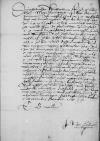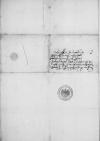Im negst(e)n hab ich E(wer) G(naden) cf. Ioannes DANTISCUS to Albrecht I von Hohenzollern-Ansbach Löbau (Lubawa), 1532-11-25, CIDTC IDL 5389⌊geschrib(e)ncf. Ioannes DANTISCUS to Albrecht I von Hohenzollern-Ansbach Löbau (Lubawa), 1532-11-25, CIDTC IDL 5389⌋, das ich durch meynen(n) bruder, / den ich hie zu E(wer) G(naden) geschickt, / etliche muntliche werbunge wolde thun / in freuntlicher zuvorsicht, E(wer) G(naden) werd die guttlich von mir uff nhemen(n) und vorsthen(n) / und sich dar innen(n), wie meyn(n) g(nediger), liber her(r) beweisen(n), / derhalben(n) ich E(wer) G(naden) bit, wolt dissen(n) meynen(n) bruder von meynen wegen(n) guttlich vorhören(n) / und im in dem(m), / was her in meynem(m) nhamen(n) E(wer) G(naden) wirt anczeigen(n), / nicht anders als mir selbst glouben(n) geben(n) / und was her E(wer) G(naden) und derselbtig(en) Dorothea of Denmark (*1520 – †1580), Electress Palatine; wife of Elector Palatine Friedrich II, daughter of Christian II of Oldenburg, King of Denmark and Norway and Isabella of Austria⌊furstynnen(n)Dorothea of Denmark (*1520 – †1580), Electress Palatine; wife of Elector Palatine Friedrich II, daughter of Christian II of Oldenburg, King of Denmark and Norway and Isabella of Austria⌋ / kleyn(n), geringe werck von(n) meynen(n) wegen(n) wirt vor ehren(n) / freuntlich und gunstlich uff nhomen(n) und nicht das gegeben(n), / sunder meyn(n) dinstlich gemut und willen(n) ermessen(n), / do neben(n) ouch meyn(n) svoger, den(n) h(e)rn Johann Reyneck (†1535), the second husband of Dantiscus' sister Anna; doctor of both canon and civil law; councillor to Duke Albrecht von Hohenzollern (BORAWSKA 1984, p. 179-180, 203; GÜNTHER 1907, p. 365)⌊doctorJohann Reyneck (†1535), the second husband of Dantiscus' sister Anna; doctor of both canon and civil law; councillor to Duke Albrecht von Hohenzollern (BORAWSKA 1984, p. 179-180, 203; GÜNTHER 1907, p. 365)⌋, E(wer) G(naden) diner, / befholen(n) haben(n) / und meyn(n) g(nediger), lib(e)r her(r) seyn(n) und bleib(e)n. / Got der almechtige enthalde E(wer) G(naden) in langweriger gesuntheit und glukseligem(m) zunhemen(n) lange zceit. /
 GStA, PK, HBA, C 2, No 36, f. 2v
GStA, PK, HBA, C 2, No 36, f. 2v  GStA, PK, HBA, C 2, No 36, f. 1r
GStA, PK, HBA, C 2, No 36, f. 1r 
